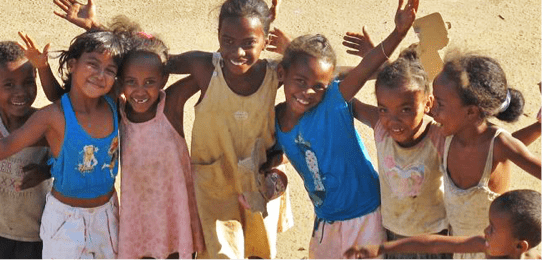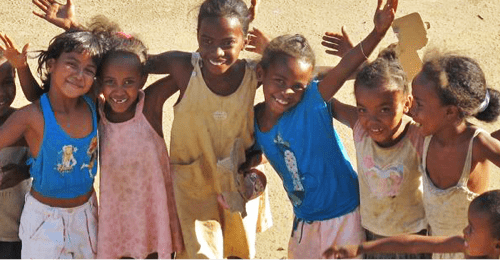
Man Madagascar is poor. Officially 77% are below the poverty line, but we’ve seen heaps that you would say are worse than that, they’re in essence, destitute. The Malagasys work really hard in the fields mainly as they try their best just to cultivate enough to live on. You don’t see many here that anyone would describe as shirkers, that group that according to some are apparently holding the NZ welfare benefit regime to ransom. Fall for that Kiwi myth if you will, but here it’s all hands to the pump that’s for real – there are no safety nets.
Encouragingly that engenders a hugely impressive culture of sharing – shared effort, sharing of any resources that might come along and sharing the burden when hard times hit. Every time we have given someone food they have immediately sought to share it with whoever is in the immediate vicinity. This has happened time and time again as we’ve stopped on the roadside to boil the billy and have a bite, so we’ve concluded it is engrained in these folks’ culture. We’ve never seen this to the extent we have in Madagascar – handing over half a loaf of French bread and a couple of tomatoes for example could see that being shared amongst a dozen people, it is a revealing display of the human spirit and gives you hope.
But despite their benevolent disposition to their fellows in similar predicament the reality is that life here is really hard, and there are many conflicts that are unavoidable. For example the conflict between the need to survive that see trees being cut down for wood for producing clay-fired bricks and charcoal used for cooking, yet without doubt the island is running out of trees – it is virtually bereft of primary forest now and so its precious wildlife is interminably on the road to extinction. That’s sad, not just for humankind, but also for the future of any tourism here and ultimately the ability of the 70% of people in the rural sector to sustain themselves as the soil erosion that’s resulted is significant.
Then there’s the conflict between the cattlemen and the cultivators. Every inch of land is used for production and the free-roaming cattle herds do a lot of damage to the paddy fields if they inadvertently wander across the. And that happens more frequently as the population just keeps growing, the number of mouths to feed with it. Urbanisation is expanding but for many who drift to town they’re swapping a life of meagre returns from growing crops, for a life of meagre returns from hawking trinkets or their labour on the city streets. Antananarivo is bursting at the seams, its infrastructure cannot cope, the water and sanitation conditions for the disenfranchised living on its streets are desperate. Only 7% of households have piped water, 60% get their water from sources without any treatment, and 32% of householders defecate in the open. Seeing the state of many rivers, health problems linked to contaminated water sources and insecure waste disposal remain substantial.
We thought we’d seen poor health conditions in North Korea earlier this year, but the rates of stunting amongst the children of Madagascar is even higher at around 50%. The political crisis here which saw a coup in 2009 has seen what paltry public services existed fall ever since – schools are no longer delivering as the State’s ability to pay teachers has fallen away, and the secondary school completion rate that was 25% has fallen away since the coup. In addition the health system has seen clinics closing down and immunisation programmes being wound back as the annual health budget falls to $US2.90 per capita. 70% of the State’s budget was coming from international agencies but since the coup much of that has stopped. The immediate prospects then are for things to get worse rather than better.
As with much of Africa the problem is lack of income and that requires not only political stability and less corruption at home, but it needs in addition opportunities for the country to sell its wares. Those resources include oodles of cheap labour – and these folk already work hard so there’s nothing new in that regard – and there are mineral resources, as well as some of its unique natural capital remains intact and that could attract tourism. But which is the chicken and which is the egg? Without political stability and equity foreign investment won’t be attracted, and with foreign investment political stability remains elusive.


Comments are closed.